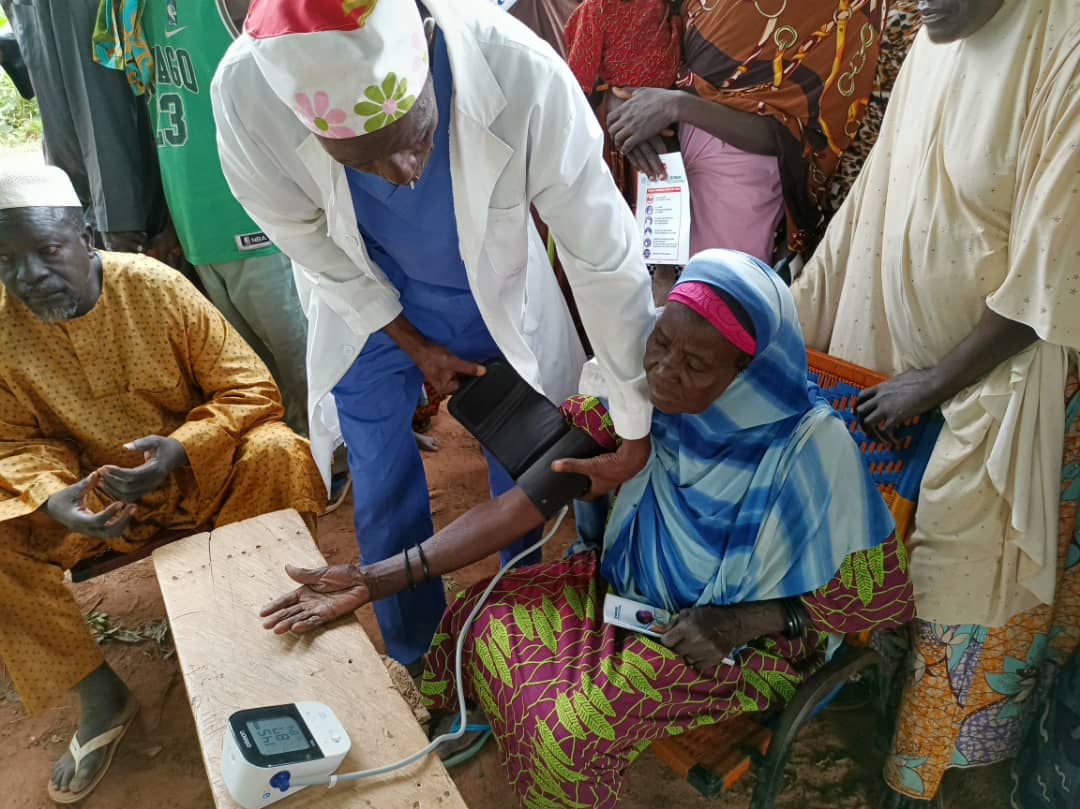REPORT 2022 - 2023
Epigraph:
Author:
- Home
- Executive overview
- Working together
- Impact on the Ground
WHO Region:Country, Territory or Area:Filter search results




- Countries enabled to provide high-quality, people-centred health services, based on primary health care strategies and comprehensive essential service packages
Increasing access to prevention and control of noncommunicable diseases and COVID-19 through a youth festival
In Niger, 4.3% of the population has diabetes[1] and 27.7 percent of adults (18 to 69 years) are hypertensive. However, access to healthcare, especially in rural areas such as Dosso in South-West Niger, is difficult, resulting in a staggering of 95.6% of hypertensive individuals being left untreated.[2] Persistent barriers include low health literacy and limited medical equipment. In response, the World Health Organization (WHO) capitalized on the Sukabe youth arts and culture festival held in Dosso, Niger in August 2022, to educate 300 young people about diabetes, hypertension, COVID-19, and family planning. These young people, armed with WHO-produced materials, pledged to propagate this knowledge within their communities. Furthermore, a mobile sensitization caravan expanded the intervention's reach to approximately 552 people across three neighbouring villages. Through screening, 66 hypertensive and 7 hyperglycemic individuals were identified and referred to local Integrated Health Centers for adequate care. Before the festival, the COVID-19 vaccination coverage in Dosso was less than 10%. However, festival-led sensitization efforts doubled this figure to 20.4%, showcasing the intervention's effectiveness in bolstering health literacy and facilitating the prevention, detection, and management of critical health conditions.
“If we don't act now, the number of sick people is likely to double due to a lack of awareness”
- Village chief, Dosso District, Niger
How did Niger, with the support of the WHO, achieve this?
To improve healthcare access in Dosso, Niger, WHO harnessed the Sukabe festival as a platform for delivering key health interventions. Before the event, the WHO team in Dosso, in collaboration with regional health authorities, undertook site visits and meetings to assess the local health centres’ needs. They identified a critical shortage of crucial diagnostic equipment and commodities, such as blood pressure monitors, glucometers, and test strips, which are vital for managing diabetes and hypertension.
In response, WHO promptly supplied these crucial equipment and commodities and, to further prepare for screening at the festival, partnered with regional health authorities to create a streamlined referral process. This enabled those who were diagnosed with hypertension or diabetes at the festival to be seamlessly referred to healthcare facilities in Dosso, ensuring their continued care and optimal management. WHO also created educational leaflets based on global guidelines to better equip health professionals to increase health literacy for diabetes, hypertension, and COVID-19.

Health professionals from the Dosso Regional Public Health Office performing a free screening for hypertension under the guidance of WHO staff members.
Photo credit: WHO Niger
As the festival was underway, health professionals from the Dosso Regional Public Health Office performed complimentary screenings for diabetes, hypertension, and COVID-19. On top of the equipment and commodities, WHO provided financial support as well as technical expertise through staffing support and relevant communication materials for prevention and screening. The Sukabe festival attracted about 350 participants, while a mobile sensitization caravan expanded the outreach to an additional 150 people in nearby villages. To ensure that the impact of the intervention spread beyond festival attendees, the national health authorities identified 300 youth to be empowered for further activities. They were briefed during the festival and subsequently assumed roles as health educators, committed to enlightening their peers and families about COVID-19, diabetes, hypertension, early marriage and pregnancy using WHO-produced resources in their communities.
The outreach activities ensured that WHO's interventions extended across Dosso's diverse population, particularly influencing the over-60s, who formed the majority of those diagnosed. As a result, there was an improvement in the community's knowledge about COVID-19 transmission, symptoms, and overall awareness of personal health conditions such as diabetes and hypertension. After the festival, attendees reported an increased understanding of the disseminated health information and expressed a commitment to prioritize their health, including COVID-19 vaccination. A marked increase in demand for health services at the village level, especially concerning cardiovascular risk factors and COVID-19 vaccination, was noted.[3]
“I am very happy to have participated in this festival because I learned a lot about how to protect myself against COVID-19, and how to avoid diabetes. Tomorrow I will go to the district hospital to get vaccinated against COVID-19 and I will also educate my family members to do the same.”
- Hamsatou Garba, Mokko, Dosso District, Niger
As the intervention was positively received, WHO, in collaboration with the regional authorities, expanded the health interventions after the festival to ensure a sustainable impact. Screenings for hypertension and diabetes have since been conducted in other Dosso villages, including Moko, Kargui Bongou, and Deytagui Niandou, thereby continuing the mission to improve public health across the region.
References
- World Health Organization. Stakeholders call for increased access to diabetes education [news]. Stakeholders Call for Increased Access to Diabetes Education.
- World Health Organization. 2021 STEPS Country Report Niger [report]. 2021 STEPS Country Report Niger, accessed 29 January 2024.
- WHO Niger annual report 2022.
- Countries enabled to provide high-quality, people-centred health services, based on primary health care strategies and comprehensive essential service packages
